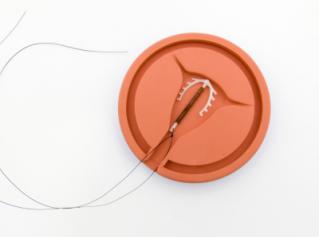IUD
Information about the IUD
All necessary information about the IUD. Complete information on the IUD. How the IUD works. Effectiveness, advantages and disadvantages of IUD.

IUD also called Mirena IUD, hormonal IUD or Coil IUD.
The IUD also known as an intrauterine device is a small device made of plastic and metal (copper, gold or silver), which is very flexible that is placed inside the woman's uterus. A gynaecologist is responsible for inserting the IUD preferably when the woman is menstruating because that is when the neck of the cervix is ??most open, plus it’s when you can guarantee and clearly see that a woman is not pregnant.
Before a gynaecologist can insert the IUD they have to measure your uterus and produce your current sexual history, plus you have to have a gynaecological examination, they will ask questions to find out how many births you have had, if you have or have had any diseases, etc.
At one end of the IUD there is a thread, this is important as by pulling on the thread is the way the device is removed later. A gynaecologist is responsible for both the process of inserting and removing the device. The removal should also be done when the woman is during her period of menstruation.
Now there is a new generation of IUDs, called Mirena IUD, it maintains the T-shaped base containing the hormone levonorgestrel, this is released into the uterus constantly to avoid a possible pregnancy.
The role of the IUD is to hinder the passage of sperm into the fallopian tubes and prevent the implantation of the egg in the event that it has been fertilized, it does this by making changes in the endometrium, changing the movement of the fallopian tubes, blocking the passage of the sperm, etc..
It is normal during the first three months to menstruate more abundantly with possible months of menstruation that are more painful than usual. After this time, everything will return to normal, although it is possible that you have some losses (spotting) between periods. This is not important, and should not scare you.
It is important to make sure before IUD insertion that you have no infection either in the uterus or vagina.
When you have an IUD inserted it is very important to control any vaginal infection however small, as there is contact between the vagina and the uterus through the IUD thread, this may cause complications. Should you experience any itching of the vagina or bad-smelling discharge, you should see a doctor and explain your circumstances.
There are different models and sizes to suit all types of women.
IUD: effectiveness
- The IUD or intrauterine device has an efficiency of between 98% and 99%.
IUDs: advantages
The following are some of the advantages of IUD use:
- The time the IUD can be in the uterus of women is between two and five years.
- The IUD is a contraceptive that is comfortable and effective and does not produce major side effects to women.
- Women who are breastfeeding their children can use the IUD.
- It is contraceptive that does not requiere a daily routine, sich as contraceptive pill.
- When removing the IUD a woman's fertility returns immediately.
There are no restrictions in using IUDs in women who
-They had a baby and are over 20 years old.
-Started breastfeeding.
-They have a breast disease.
-Smokers
-Diabetics
-Have had an abortion during the first trimester of pregnancy.
IUDs: disadvantages
Here are some of the disadvantages that you can have with the IUD use:
- The IUD does not protect against sexually transmitted diseases or infections, it can be used as a vehicle by germs to get to the uterus faster thus making an infection worse.
- The IUD is not recommended for women who have not had at least one pregnancy.
- It is not recommended to use tampons during menstruation, because they might wrap around the thread. After each menstrual cycle to check all is as it should be, you should insert your fingers into the vagina, checking the thread remains in place, and therefore also the IUD.
Women cannot use the IUD in the following cases
- When you are pregnant.
- When you have a vaginal bleed that cannot be explained.
-When you have an infection caused by an abortion.
- When a woman has cancer of the ovaries, endometrial and is being treated.
- When there is an infection after delivery, etc.
A Woman cannot have the IUD if she belongs to any of these cases, the doctor may advise you to use another contraceptive.
Most popular FAQs
- What happens if they find abnormal cells in the pap test?
- What do natural contraceptives require from a couple?
- If I have had female sterilisation, is there a possibility of reversing the operation?
- What type of lesions does contagious molluscum cause?
- What are the alarm signals that I should pay attention to after aborting?
Questions by recent users
- hello, am not sure but I think I might be pregnant as i had unprotected sex during my fertile days the test says negative but my tummy hasn't stopped hurting
- What do I have to take with me on the day of surgery?
- What if I get to the appointment and change my mind :/
- Is there anyway I can find out about a previous abortion I have had?
- Appointment on bank holiday



